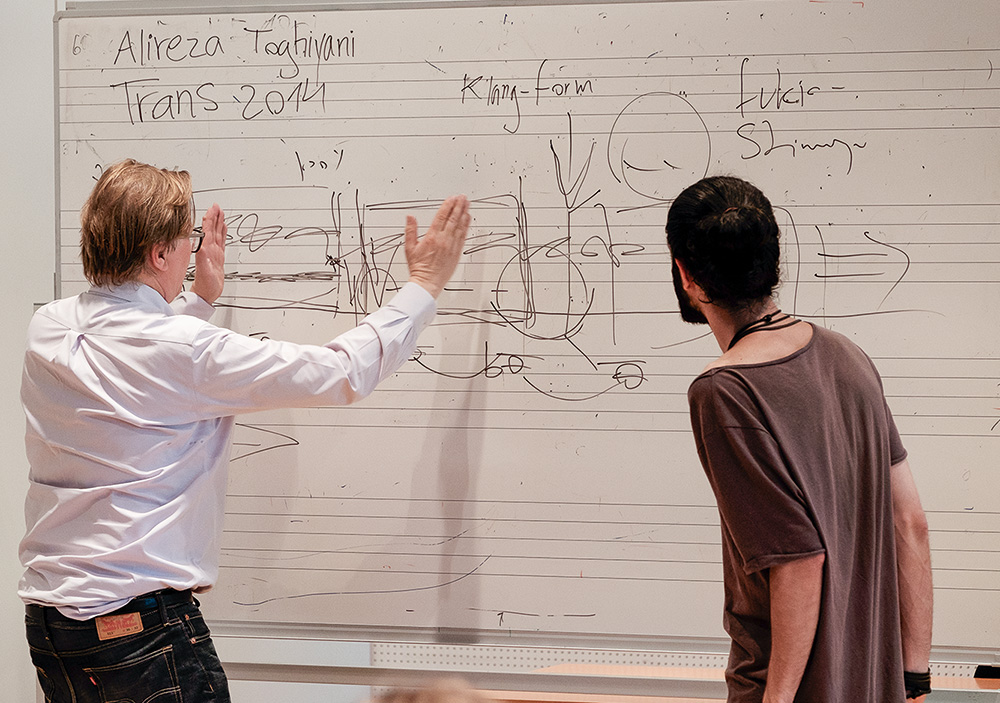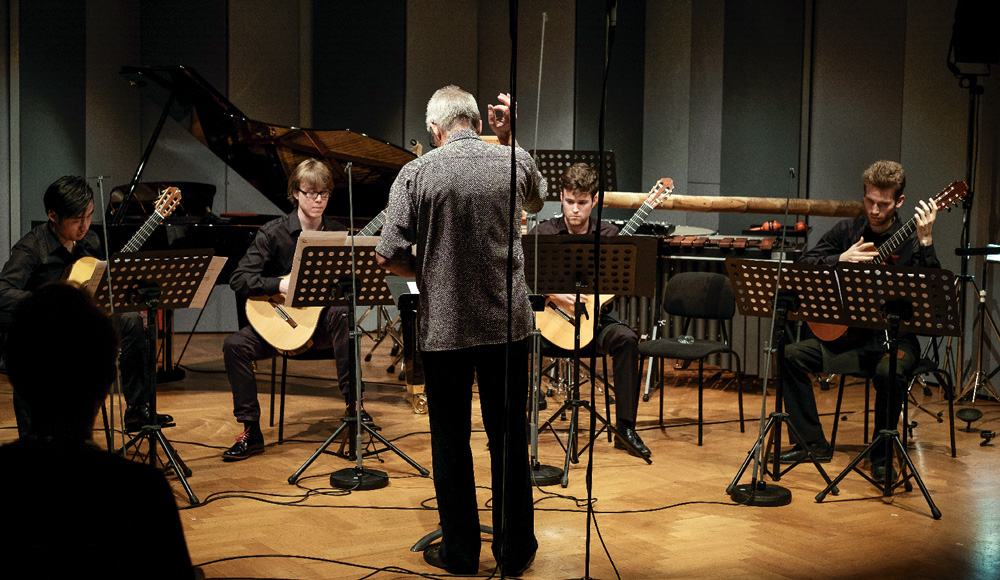Over the past ten years, contemporary music has come to occupy an important position at the mdw. And as the member of the teaching staff responsible for contemporary music activities at the mdw and the successor to Peter Burwik, I have made it my goal to confront students with challenging contemporary music masterpieces and support them in preparing 20th- and 21st-century repertoire for performance.

As part of the practicum Musik der Gegenwart [Music of the Present],an obligatory subject for all instrumental performance majors, the rehearsed programmes are performed as in-house concerts—and there also exists a successful initiative to enable an interested public to hear these programmes in concerts outside the mdw, as well.
A brief look back: in the autumn of 2008, I was able to organise a portrait concert featuring music by Olivier Messiaen in the Glass Hall of the Vienna Musikverein to mark this composer’s 100th birthday. Performance majors played repertoire including such key works as Couleur de la cite celeste and Oiseaux exotiques for solo piano and ensemble with a very high degree of professionalism. In 2010 came our initial collaboration with the Arnold Schönberg Center in connection with a celebratory concert for the 85th birthday of Pierre Boulez, whom I had had the privilege of serving as an assistant for several productions. With the composer present, we played two landmark 20th century works—Arnold Schönberg’s Pierrot Lunaire and Pierre Boulez’s Le marteau sans maître—in the same programme. Further classics of modernism including chamber concertos by Alban Berg and György Ligeti, the Trossova-Lieder by György Kurtág, Mouvement – vor der Erstarrung by Helmut Lachenmann, Sur Incises for ensemble by Pierre Boulez, and Erwartung by Arnold Schönberg with KS Deborah Polaski were also worked on during this period. In 2012, the German composer Helmut Lachenmann paid us a visit at my invitation and even performed as the speaker in his composition Zwei Gefühle – Musik mit Leonardo. And over the years that followed, there were fascinating encounters between the students and the important contemporary composers Tristan Murail, Beat Furrer, Georg Friedrich Haas, Michael Jarrell, and Bernhard Lang. A concert was also devoted to the oeuvre of Salvatore Sciarrino, who was unfortunately unable to show up personally in Vienna due to illness.
A focus on contemporary music, set up by the Office of the Dean of Instrumental Studies and anchored in the curriculum since 2010, has developed quite successfully in recent years and has thus been retained in the new curricula. Specific playing techniques that represent significant components of contemporary music but cannot be dealt with sufficiently in traditional teaching are taught separately for each individual instrument by specialists from contemporary music ensembles, above all from Klangforum Wien. Learning to read rhythmic aspects and to interpret new sonic structures—and, of course ensemble playing—are major challenges that greatly enrich one’s study of an instrument. And the resulting long-term collaboration with the musicians of Klangforum Wien has likewise had positive effects in terms of engaging players in special ensembles for contemporary music and the establishment of new ensembles.

In 2012, the existing contemporary music emphasis was made part of the mdw’s Joseph Haydn Department and equipped with a dedicated budget for the various related projects and workshops as well as for the acquisition of instruments not yet owned by the University. It is in this context that the annual composer focuses arose, which involve internationally known contemporary composersworking together with students on their music for one-week periods, at the end of which it is performed in two concerts—once at the mdw, once at the Arnold Schönberg Center.
2016 saw mdw establish a professorship as well as a master’s degree programme in contemporary music. And as the newly appointed professor of contemporary music, I am responsible for heading the contemporary music division of my department and for providing artistic guidance to the student ensemble of the contemporary music master’s degree programme: Webern Ensemble Wien. My central missions are further nurturing contemporary music activities at the mdw and, by developing Webern Ensemble Wien, creating a continually existing formation for the interpretation of contemporary music by specialists. This year saw the ensemble get off to a successful initial start: as part of a cooperative project with the Shanghai Conservatory of Music, Webern Ensemble Wien (in a formation numbering 11 students) played two highly successful evening programmes in Shanghai featuring music by Chinese and Austrian composers, respectively.
Further performances, including an avant-garde programme with works by Dieter Schnebel, Klaus Huber, Bruno Maderna, Cornelius Cardew, and Harrison Birtwistle at the Odeon Theatre in Vienna for the festival Wien Modern, are currently being prepared.
Close cooperative relationships as well as exchange with contemporary music departments at other universities and academies of music enable the students to expand their networks and their repertoires.
The international project LoLa, for example, led to an unusual concert in December 2017 that saw new works by Austrian and English composing students performed by a combined ensemble of students from the Royal College of Music in London and the mdw in Vienna brought together in real time via a live stream.
One should also mention the inter-departmental collaboration with the Department of Conducting. The conducting students have the opportunity to work regularly on the ensemble pieces prepared with the ensemble by myself and my colleague Jaime Wolfson as part of their course in contemporary music at the Conducting Department (head: Simeon Pironkoff).
At the mdw’s “Auftakt” event at the ORF RadioKulturhaus, there have been several performances with contemporary music mounted in close collaboration with the Department of Composition, Electroacoustics, and Tonmeister Education and intended to function as an important platform that young composing students can use to sharpen their public profiles as artists.
Each February, the Ludwig van Beethoven Department of Piano and Harpsichord in Music Education (head: Johannes Marian) organises the Wiener Tage der Zeitgenössischen Klarviermusik [Viennese Days of Contemporary Piano Music], an interpretation course linked with a composing competition for piano that takes place every two years.
And finally, there is also a Contemporary Music focus at isa – the International Summer Academy of the mdw with courses on interpretation for individual instrumentalists as well as for existing contemporary music ensembles in connection with the composing course. For all of these courses, I invite prominent soloists from various important European contemporary music ensembles to serve as tutors.
Event tip
Jean-Bernard Matter will be represented at Wien Modern with the Harakiri project (in German).

